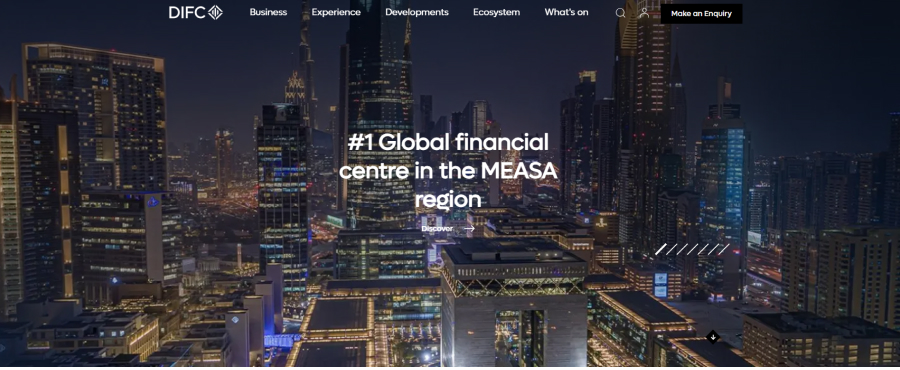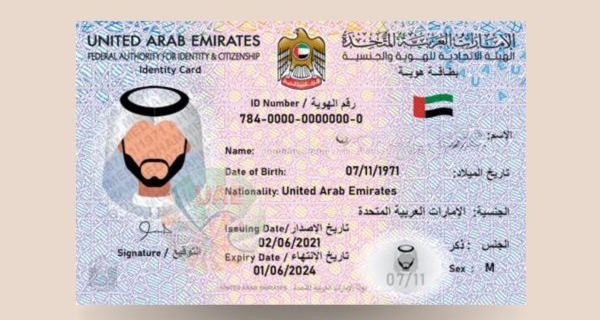Dubai International Financial Centre business setup is aimed at companies in finance and professional services that need a regulated and internationally recognized base in Dubai. The centre was launched in 2004, and unlike most free zones, it has its own independent legal system built on English common law. Dubai International Financial Centre (DIFC) Courts hear cases, and Dubai Financial Services Authority (DFSA) oversees financial institutions. Its distinctive structure is its defining feature.
The location also matters. DIFC is in central Dubai, positioned as a gateway to the Middle East, Africa, and South Asia. Global banks, asset managers, insurers, and fintech firms operate here because it combines strong regulation with modern office space and direct access to the region.
For entrepreneurs, there is more than one track. Regulated activities go through DFSA, while non-regulated businesses — law firms, consultancies, family offices — use a simpler route. Costs are higher than in other free zones, but companies get credibility and a framework aligned with international standards. For firms that need trust and transparency, DIFC has become the natural choice in the UAE.
Why Choose Dubai International Financial Centre for Business Setup?
DIFC isn’t a generic free zone. It was set up in 2004 to attract global finance, and since then it has become the main financial centre in the region. The draw is clear: a legal system based on common law, its own independent courts, and a respected regulator in the Dubai Financial Services Authority. For banks, funds, insurers, and professional service firms, that framework provides the credibility they need.
The centre is also a cluster. More than 600 regulated firms operate here, alongside hundreds of non-regulated businesses such as law practices and consultancies. The ecosystem keeps growing with fintech accelerators, venture capital platforms, and digital asset initiatives. Add to that its location in central Dubai, modern office towers, and direct access to the MEASA market, and it explains why DIFC has become the obvious base for international expansion.

About Dubai International Financial Centre
The Dubai International Financial Centre was created by federal decree in 2004 and operates under its own laws, independent from the UAE’s civil code. Its courts apply English common law, and disputes are handled by judges with international backgrounds. Regulation of financial activities is done by the DFSA, which has recognition from global bodies.
Physically, DIFC is more than just offices. It is a mixed-use district with commercial towers, retail, dining, and residential areas. That combination has made it both a business and lifestyle hub. Its positioning as the financial gateway to the Middle East, Africa, and South Asia has attracted more than 4,000 active registered companies.
Business Activities Allowed in Dubai International Financial Centre
Activities here are divided into regulated and non-regulated. Regulated businesses include banking, asset management, insurance, reinsurance, brokerage, and Islamic finance. Non-regulated activities cover law firms, consultancies, family offices, professional training, and fintech companies that don’t yet need DFSA approval.
In recent years, DIFC has also promoted innovation licenses for startups in fintech, blockchain, and digital assets. Some activities — like providing investment advice or operating as a fund manager — require detailed DFSA authorization, which can take months. Others, such as setting up a consultancy, are faster. This dual structure allows both major institutions and smaller firms to operate under the same umbrella, each with the right level of oversight.

Want to learn more about UAE business setup services?
Dubai International Financial Centre Corporate Tax, VAT, and Duties
DIFC companies sit under the same federal tax framework as the rest of the UAE, but with some clear advantages. Since mid-2023, the UAE has had a 9% corporate tax on business profits above AED 375,000. Firms registered in DIFC can still qualify for a 0% rate on income defined as “qualifying free zone income”, as long as they keep a real presence inside the centre and don’t run non-qualifying deals with the mainland.
There is no personal income tax. Salaries, dividends, and similar payments are not taxed in Dubai.
VAT is charged at 5%. Most service providers in DIFC need to register once their turnover passes AED 375,000 a year. Some financial services are exempt or zero-rated, but the majority of consulting, legal, or professional firms will be charging VAT on local invoices.
The takeaway is simple: companies in DIFC benefit from a 0% tax environment on qualifying income, predictable VAT rules, and almost no customs exposure.
Step-by-Step Dubai International Financial Centre Freezone Company Formation and Registration
Registering a company in DIFC is not the kind of quick, one-week process you might find in smaller zones. The centre is built for finance and professional services, so checks are detailed and regulators expect thorough files. Still, once you understand the steps, the path is straightforward.
The Registrar of Companies (ROC) allows several structures. The most common is the Private Company Limited by Shares (LTD), which suits most operating businesses. Larger ventures can opt for a Public Company (PLC) if they plan to raise capital or list shares. Existing foreign or UAE firms often register a Recognised Company (Branch) to extend operations without creating a new legal entity.

Required Documents and Timeline
Every applicant provides standard personal paperwork: passport copies, proof of address such as a utility bill or tenancy contract, and an entry permit if a UAE residence visa is planned.
On the corporate side, the Registrar asks for a full set of constitutional documents. These include the Certificate of Incorporation, the Memorandum of Association (MOA), and Articles of Association (AOA), plus a Share Register showing the ownership structure. A board resolution authorising the new entity is also required, and in some cases, a Certificate of Good Standing from the parent company if the shareholder is an existing firm.
Timelines reflect this difference. A non-regulated firm can expect approval in roughly six to eight weeks, while a regulated institution may spend four to six months in review with the DFSA before a licence is issued. Visa processing runs in parallel, but only after the company has been incorporated.
Remote Registration Option
The application can be started abroad. The Registrar and the DFSA accept digital filings, and original papers can be couriered. Video calls are used for verification in some cases. Still, a few steps remain tied to Dubai: opening a bank account usually involves a physical meeting, and visas cannot be issued without medical tests and biometrics on site. In practice, most companies handle 80% of the process remotely and send representatives only when personal presence is required.
Types of Licenses and Costs in Dubai International Financial Centre Freezone
DIFC does not issue standard “trading” or “industrial” licenses like other UAE free zones. Instead, the system is built around categories of activity.
- Financial services firms — banks, insurers, asset managers, investment advisors — must go through a full licensing process with the Dubai Financial Services Authority (DFSA). This includes submitting compliance manuals, AML policies, governance structures, and financial projections.
- Non-financial firms — such as law practices, consultancies, family offices, and holding companies — register directly with the DIFC Registrar of Companies. Their requirements are lighter, with no DFSA involvement.
- FinTech and startups — DIFC has created an Innovation License, aimed at early-stage fintech, blockchain, and digital asset businesses. Entry costs are lower, and firms can also join accelerators such as the FinTech Hive.
- Retail and professional services — DIFC’s mixed-use district also allows certain retail outlets, restaurants, and service providers to operate within the financial centre, subject to approval.
Visa Packages and Pricing Breakdown
Costs in DIFC depend on several layers. Every company pays a registration fee and an annual renewal fee to the Registrar of Companies. Regulated entities also face DFSA authorization charges, which can be significant and vary depending on the activity. For smaller firms, the Innovation License offers reduced entry costs to encourage startups in fintech and related sectors.
Visas are tied to the amount of office space leased. A small office allows only a limited number of visas, while larger spaces increase the quota. Once a company secures its license, it must register with the UAE’s immigration e-channel system to issue residence visas. Each visa comes with standard government charges: an entry permit, a medical test, an Emirates ID, and insurance. These are the same across all UAE jurisdictions.

Exact numbers aren’t fixed in public brochures, since fees change depending on activity and office size. For example, a regulated investment firm faces much higher annual fees than a non-regulated consultancy. The authority provides detailed quotations once an application is filed. What makes DIFC different is the transparency of the structure: license type, office lease, and visa quota. Nothing else is hidden.
Dubai International Financial Centre Company Formation: Who Should (and Shouldn’t) Choose This Free Zone?
DIFC is not for every investor. It was built as a financial hub, and its rules reflect that purpose. For some businesses, it is the perfect fit; for others, it is too specialized and too costly. Here is a clear breakdown.
Who should choose DIFC (YES):
- International banks and financial institutions need a regulated environment.
- Asset managers, private equity funds, and investment firms are seeking DFSA oversight to build credibility with global partners.
- Insurance and reinsurance companies that want to operate in a jurisdiction with its own regulator and courts.
- Law firms, accountancy practices, and consultancies are looking for proximity to major financial players.
- Family offices that want a trusted base to manage regional wealth.
- Fintech startups that qualify for the Innovation License and want access to accelerators such as the FinTech Hive.
- Businesses targeting the Middle East, Africa, and South Asia need a recognized financial centre as a hub.
Who should not choose DIFC (NO):
- Freelancers or solo consultants searching for the cheapest setup. DIFC is one of the more expensive zones in Dubai.
- Trading or logistics companies that need warehouses or industrial space. DIFC does not provide those facilities.
- Small e-commerce businesses or startups outside finance and professional services. Other free zones, such as IFZA or Meydan, are better suited.
- Applicants from high-risk nationalities may face extra scrutiny, which can delay or block approvals.
- Companies that do not need regulatory credibility. If your business does not deal with financial products or sensitive client assets, the cost of DIFC may outweigh its benefits.
The logic is straightforward. DIFC is designed for finance, law, and related services. If your company belongs to that world, the centre gives you a legal framework and credibility unmatched in the region. If not, the specialization that makes it valuable will simply become a burden.
Conclusion
Dubai International Financial Centre was created with one goal: to be a financial hub that global players could actually trust. Since 2004, it has worked under its own legal system, based on English common law, with its own courts and its own regulator, the DFSA. That structure makes it different from every other free zone in Dubai.
For financial firms, credibility matters more than low setup costs. A bank or fund manager needs to show regulators and clients that it operates under a serious framework. DIFC gives them that. It is why you find the world’s largest institutions here alongside specialist boutiques and new fintech startups. More than 4,000 companies are already registered, and the number continues to rise.
The environment itself helps. DIFC sits in central Dubai, with Grade-A office space, residential towers, retail, and restaurants all in one place. It is not a remote industrial park; it is a full district. For lawyers, consultants, family offices, and wealth managers, being inside that cluster means working where the deals actually happen.
There are limits. DIFC is not designed for everyone. Freelancers looking for the cheapest option will be better off in smaller free zones. Manufacturing, trading in consumer goods, or warehousing does not belong here either. The process is also heavier: a non-regulated firm may wait two months, while a bank may spend half a year in DFSA review. And costs are higher than in multipurpose zones — deliberately so, because oversight is the selling point.
So the decision is simple. If your business is finance, law, or professional services, DIFC gives you the structure and reputation that open doors worldwide. If not, the specialization becomes a barrier.
The way forward is to define your activity, check whether it is regulated, prepare the documents, and plan the timeline. Much can be done remotely, but the process is strict. Working with experienced consultants avoids costly mistakes and keeps the file moving.
If your plan is to establish a serious financial presence in Dubai, DIFC is the place to do it. Get in touch with our team today and start the process on the right foot.
Yes. Most of the registration can be handled remotely through the Registrar of Companies portal. Initial filings, document uploads, and even regulator communication are all online. But at some point, directors or shareholders will usually need to come to Dubai for banking interviews or to finalize visas.
The authority itself expects fees to be settled up front. Some licensed service providers in Dubai offer their clients installment plans, but that is between the consultant and the client, not DIFC directly.
Yes, but only within the scope of the license. A regulated asset manager can serve international clients. A consultancy can advise clients abroad. What you cannot do is use a DIFC license to run unrelated import–export operations; the centre is not structured for that.
Anything regulated by the DFSA. Banking, investment management, insurance, and financial advisory all go through a detailed authorization process. Non-regulated businesses — like law firms or professional services — only need the Registrar’s approval, which is quicker.
